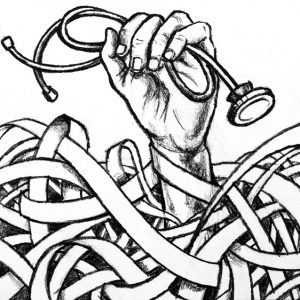by Robert A. Duke
Enter and Look Around — Free and Easy
The front entrance to the doctor’s office is typically a patients’-only view of the health care system, but Whatcom offers a back door with a welcome mat inviting you to tour what we can usually only see when sick or dying. A bit too late, at that point, you’d agree.
Medical appointments are usually a hectic 15 to 30 minutes focused on quickly getting to the point of your visit. But by entering through this back door, always standing open, marked Advance Care Planning (ACP), you can have a leisurely look around with the benefit of a docent: your own physician or trained facilitator.
One day, your need for health care may require knowledge of the whole system, when a mere visit to your doctor’s office will not suffice. When that day comes no one is going to take you by the hand to lead you through the maze of treatment, to speak and decide for you unless you prepare. Then your familiar primary physician will likely explain the next step in your treatment, point you toward the exit and wish you a speedy recovery. You’ll be on your own: prepared or unprepared, and it will be up to you then to navigate your course of treatment.
Besides understanding the unfamiliar system to which you’ve been banished, this foreign area of the health care system is populated by strangers and specialists with whom you must communicate. To care for yourself or a loved one in a medical crisis, you need to comprehend the health care system and have some fluency in medical language. But how can you acquire this, other than by trial and error? Aside from experience, there is only one course open to the average patient and caregiver: Advance Care Planning.
Though ACP was developed to address end-of-life issues, ACP supporters soon realized that end-of-life can be a long time thanks to modern health care and that planning end-of-life care is excellent preparation for any health event requiring immersion in the complex health care system. I see ACP as a 21-century version of public Red Cross lifesaving courses or CPR-training from decades past. Given the blessing of more health care, greater medical technology and longer life, modern patients need greater knowledge about medical treatment and care.
Since When?
ACP advance directives were first developed in the United States in the late 1960s. In 1967, attorney Luis Kutner suggested the first living will in order to facilitate “ … the rights of dying people to control decisions about their own medical care,” according to medicinenet.com. In 1968, the first living will legislation was presented to a state legislature in Florida to allow patients to make decisions about the use of life-sustaining equipment, but the bill failed. It wasn’t until September 1976 that California legally sanctioned the first living wills. Within a year, 43 states had considered living wills and seven states passed bills.
Legislation progressed state-by-state until by 1992, when all 50 states had legalized some form of advance directive. Currently, an estimated national average of one-third of citizens have an advance directive.
In 2016, Medicare began reimbursing ACP counseling — discussions that physicians and other health professionals have with their patients regarding end-of-life care and preferences (kff.org). ACP is the recent collective term for various documents directing end-of-life care and treatment, including:
• Living Wills
• Advance Directives
• Health Care Proxy
• Durable Power of Attorney (DPOA)
• Advance Health care Directive
• Personal Directive n POLST Form
It’s less important what it is called than that you act to learn about the purpose and scope of these documents, and that you begin to familiarize yourself with the medical and legal language for your own or a loved one’s mortal confrontation with the health care system.
Whatcom Alliance for Health Advancement
Locally, the Whatcom Alliance for Health Advancement (WAHA) has provided an ACP service titled End of Life Choices since 2012. It is a community-wide advance care planning service for assisting residents with documenting their medical care wishes in an advance directive. WAHA offers free community workshops and meetings with certified facilitators to help prepare directives — for free. Facilitators can also guide residents in choosing a health care agent and in understanding care preferences. Additional WAHA ACP services include:
• Advance care planning conversations.
• Document completion.
• Notary service. n Copying.
• Sharing documents with physicians and hospitals.
Taking the Advance Care Planning Course
The free course in preparing your ACP includes personal tutors and online assistance, if desired, yours for the asking at WAHA. There’s no waiting and locations are convenient, but some homework is required, though everyone passes and graduates. At your ACP workshop or consultation, questions are encouraged, so no cramming is needed to prepare for your first session.
For overachievers, there are levels of advanced learning and for slackers there’s health care 101 and you’re done.
What you begin to learn is how institutions such as hospitals and providers such as doctors relate to patients in crisis. What information do hospitals and doctors need you to supply so they can treat you most effectively? What decisions or choices must you and/or your representative make to expedite diagnosis, care and treatment.
Some of these choices or decisions are so essential that if you will not choose or decide, someone else — perhaps a court judge or a patient advocate — will do it for you?
Alternatively, you can now start your ACP education directly with your primary care physician because, starting in 2016, Medicare began reimbursing primary care physicians (PCP) for ACP discussions. WAHA and PCP are equally effective, but I personally favor talking with my PCP because it is a great opportunity for the two of us to get to know each other better and share my outlook on life.
My advice is to prioritize getting started and not worry about finishing your ACP at your own pace. Yes, there is an ultimate deadline for completing your ACP, but you can never finish it without starting it. Even if you view it as an onerous task, if you’re a grown up, mature adult, you owe it to yourself and those who care for you to accept this responsibility.
What You’ll Learn, What You’ll Decide
What exactly is the curriculum of this free “course?” It is all contained, in detail, in the documents you’ll use to record your decisions and choices, but here is a severely condensed list (due to space limitations) of subjects to be considered, discussed, debated and acted upon (topics, I think you will agree, unlikely to come up in an ordinary appointment with your physician):
Who do you want to make your health care decisions for you?
• Spouse, partner, close friend, doctor?
• Can you talk frankly to this person?
• Do you think others will support your decisions?
Do you know enough about the kinds of treatments?
• Cardiopulmonary resuscitation (CPR)?
• Breathing machines.
• Dialysis.
• Feeding tube or an intravenous (IV) line.
How do you feel about the use of life support if you:
• Can’t be cured?
• Are in a coma?
• Have a long-term illness that gets worse over time?
What concerns you the most?
• Pain or being kept alive on machines?
• Losing your ability to function and live on your own?
Are there things that scare you?
What does quality of life mean to you?
• Able to function and live on your own?
• Okay with living in a hospital or nursing home?
Here are some other questions to think about:
• Where do you want to spend the last days of your life?
• Do medical problems right now affect your life?
• Will implanted cardiac devices need to be deactivated at some point?
• Do your religious or spiritual beliefs keep you from having a living will?
• Will you be able to practice religious rituals before you die?
Try to picture yourself in each of the situations after below.
• What if you had a disease that couldn’t be cured?
• What if you had Parkinson’s disease or Alzheimer’s disease?
• Would you want to be given food and fluids through a tube?
• Would you want to be given strong doses of medicine to ease pain even if they make you groggy and not able to think clearly?
• What if you were in a coma and there was little chance you would come out of it?
Just thinking about these questions, let alone answering them, would be the beginning of advancing your health care education — I’m unaware of any other way to do it. Discussing these questions with doctors, trained tutors, friends or relatives would be an important step for your future health care. Answering such questions plainly illustrates the conundrum facing health care providers in caring for and treating patients any time, but especially at the end of life.
One thing I’ve learned in my decade-long pursuit of health care system reform is that the system is really good at looking out for its own interests. There is a powerful message for patients in how insistent health care stakeholders are in pushing public adoption of ACPs. If hospitals, health insurers, medical societies, government agencies, doctors, pharmacists and nurses strongly favor ACPs, it’s a sure thing these professionals and businesses have deeply serious concerns about the end of life, which you should take seriously too.
If you don’t recognize a wakeup call when one is sounded, you’re going to be terribly disappointed one day — probably saying to yourself, if I had only known then what I know now.
To get started with your Advance Care Plan, contact Australia Crosby, Operations Manager, at Whatcom Alliance for Health Advancement at:
800 E. Chestnut St. Bellingham, WA 98225
Monday-Friday 9:00 a.m. to 5 p.m.
Phone 360-788-6594
E-Mail: info@whatcomalliance.org
Visit Web page: whatcomalliance.org.
Other Whatcom Alliance for Health Advancement Services
• Fostering participation to improve the community’s health care system. As a community-based organization WAHA is governed by a leadership board that includes citizens and representatives from local health care, public health, business, and governmental organizations.
• Navigating a five-county region to help people search for, compare and enroll in health plans offered through Washington’s health plan finder.
• Sponsoring the Whatcom County Statewide Health Insurance Benefits Advisors (SHIBA) trained volunteers’ program to educate, assist and advocate for Medicare consumers about their health insurance and care access rights.
• Participating in an oral health improvement program to increase dental care for Medicaid-eligible children under age six.
• Linking uninsured, qualifying individuals to mental health services.
• Providing intensive-case management services to medically and behaviorally complex patients needing help coordinating their care in order to decrease emergency room visits.
________________________________________
Robert A. Duke is author of “Waking Up Dying: Caregiving When There Is No Tomorrow,” and lives in Bellingham. His email: boshduke@gmail.com





























